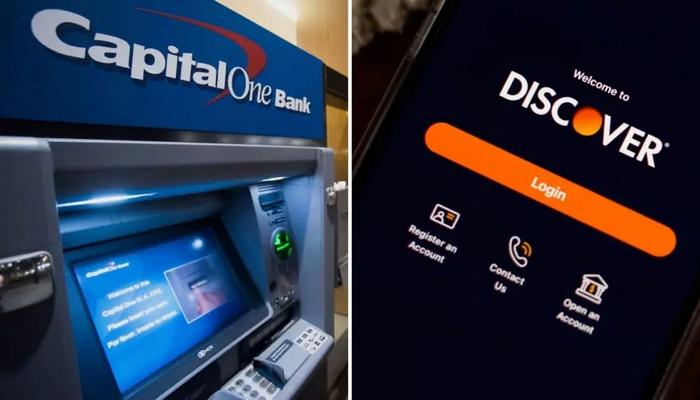Capital One acquires Discover: The impact of the merger on the market
The credit card sector is one of the pillars of the global financial system, facilitating transactions and offering credit to consumers. Acquisitions and the merger process in this sector can have a significant impact on the market, changing the balance of power between the main players and affecting the consumer experience.
Advertisements
Recently, a merger announcement between Capital One and Discover Financial caught the market’s attention and sparked interest in the implications of this union.
Advertisements
Background of Capital One and Discover
Capital One and Discover are two prominent players in the financial services industry, each with a distinct history and a significant market presence. Capital One, founded in 1994, is renowned for its innovative approach to credit cards, banking, and auto loans. It quickly rose to prominence by leveraging data analytics to offer tailored financial products, securing its position as a major player in the U.S. financial sector. With a strong focus on customer experience and technological advancements, Capital One has consistently been a leader in digital banking and credit solutions.
Discover, on the other hand, emerged in 1985 as a disruptor in the credit card industry, introducing cash-back rewards and other consumer-centric benefits. Over the years, Discover expanded its offerings to include personal loans, student loans, and online banking services. Its dedication to simplicity, transparency, and customer satisfaction has made it a trusted name among consumers and businesses alike.
Advertisements
Both companies have built robust reputations in their respective niches, with Capital One excelling in data-driven innovation and Discover in customer-focused solutions. The merger between these two financial giants represents the convergence of complementary strengths, setting the stage for a transformative impact on the financial services landscape.
The acquisition announcement
Capital One, one of the largest credit card issuers in the United States, announced the acquisition of Discover Financial, known for its popular lineup of credit cards and payment services. The transaction, valued at several billion dollars, marks one of the largest mergers in the financial sector in recent years.

The agreement provides that Capital One will absorb all of Discover’s operations, expanding its customer base and consolidating its position in the market.
The impact on the market
The merger between Capital One and Discover Financial is seen as a strategic move that could significantly alter the competitive landscape of the credit card market. By combining the two companies, Capital One will increase its market share, putting it in a stronger position to compete with giants like Visa, Mastercard and American Express.
Additionally, the merger could spur further consolidation in the sector as other companies seek to strengthen their positions in an increasingly competitive market.
Impact on consumers and businesses
The merger between Capital One and Discover is poised to bring significant changes for both consumers and businesses, reshaping how financial services are accessed and delivered. For consumers, the consolidation of these two financial giants may result in enhanced product offerings, such as more competitive credit card rewards, streamlined banking services, and greater access to personalized financial solutions. With the combined technological expertise of both companies, customers can also expect an improved digital experience, including advanced mobile banking features and robust security measures.
However, there are concerns about reduced competition in the market. With fewer players, consumers might face limited options and potentially higher fees for some services. On the other hand, the scale of the merged entity could lead to cost efficiencies that may translate into better rates and services for customers, especially if the companies prioritize customer retention and satisfaction in their strategy.
For businesses, the merger could bring opportunities and challenges. Merchants may benefit from streamlined payment processing and expanded access to credit solutions tailored to their needs. However, the consolidation may also lead to renegotiated terms for partnerships or changes in payment structures, potentially impacting smaller businesses that rely on Discover’s niche offerings or Capital One’s specific credit products.
Overall, the merger’s impact will depend largely on how the combined entity navigates its integration, balancing the need for innovation, cost savings, and maintaining consumer trust. Whether the outcome will lean more toward benefits or drawbacks remains to be seen as the merger unfolds in the competitive financial landscape.
Benefits of the merger
The merger between Capital One and Discover Financial promises to bring several benefits to both companies and their customers. The main ones being:
- Expanding customer base: The merger will allow Capital One to expand its customer base, reaching a broader and more diverse audience.
- Greater market share: The combination of the two companies will result in greater market share, strengthening Capital One’s competitive position in the credit card industry.
- Innovation in products and services: The union of the two companies’ resources and technologies will facilitate the development of more innovative products and services for consumers.
- Operational efficiency: The merger promises to improve operational efficiency, reducing costs and optimizing internal processes.
- More competitive rates: The greater scale of the combined company could result in more competitive rates for customers, making financial products more affordable.
- Improved customer service: The merger could lead to improved customer service, with more resources dedicated to customer support and satisfaction.
Challenges and regulatory scrutiny
Despite the potential benefits, the merger between Capital One and Discover Financial will face significant challenges, especially with regard to antitrust regulation. Regulators, concerned about market concentration and the potential impact on competition, will closely scrutinize the deal.
Additionally, the Biden administration has taken a stricter stance on mergers and acquisitions, which could result in more intense scrutiny and possible conditions for transaction approval.
Future perspectives
The future following the merger between Capital One and Discover holds significant potential for reshaping the financial services landscape. If regulatory approvals are granted, the integration of these two major financial institutions is expected to drive innovation in digital banking, credit solutions, and payment technologies. Capital One’s expertise in data-driven services, combined with Discover’s reputation for customer-centric products, creates an opportunity to redefine industry standards and expand market reach.
One key aspect of the future outlook involves enhanced competition with other financial giants, such as Chase, American Express, and fintech disruptors. The combined resources of Capital One and Discover could lead to the development of more tailored financial products, such as customizable rewards programs, advanced financial planning tools, and more flexible credit solutions that appeal to a broader range of customers. Additionally, global expansion could become a strategic priority, allowing the newly merged entity to tap into international markets and diversify its revenue streams.
However, there are potential challenges ahead. The success of this merger will depend not only on regulatory approval but also on how smoothly the operational integration occurs. Maintaining customer trust and ensuring seamless transitions for existing users will be critical to avoid customer attrition during the consolidation period. Moreover, regulatory bodies may continue to monitor the long-term market effects of the merger, ensuring that competition remains healthy and that consumers continue to benefit from fair practices and transparency.
Ultimately, if Capital One and Discover successfully navigate these hurdles, the merger could serve as a blueprint for the future of financial services, influencing the strategies of competitors and further accelerating the evolution of digital banking and credit markets. This partnership has the potential to set new benchmarks for customer experience, financial accessibility, and technological innovation in the ever-changing world of finance.





